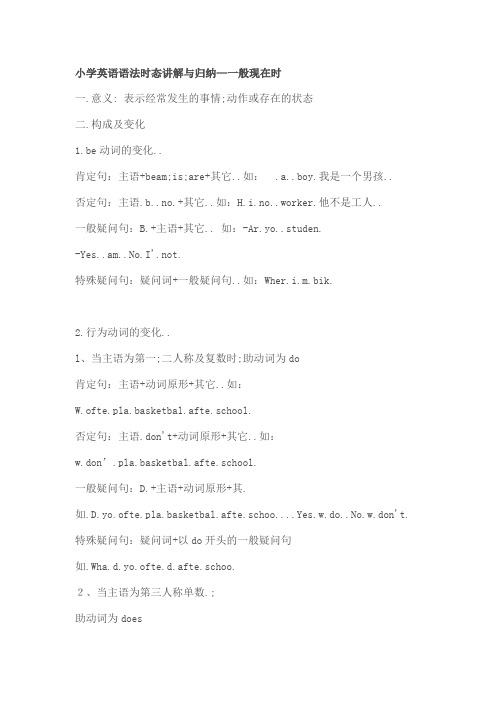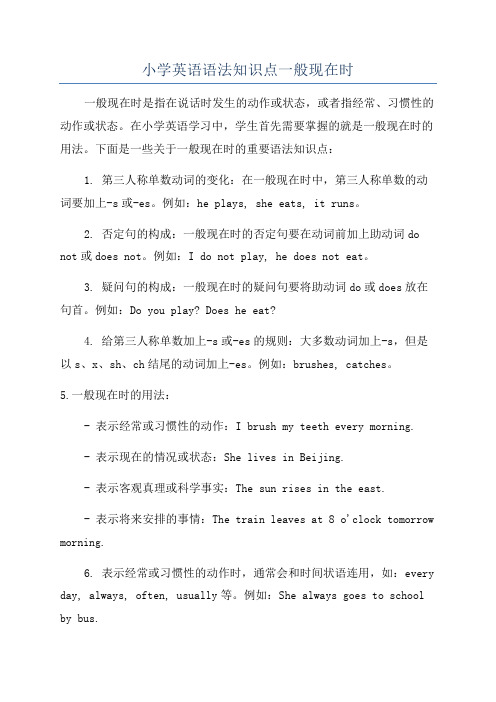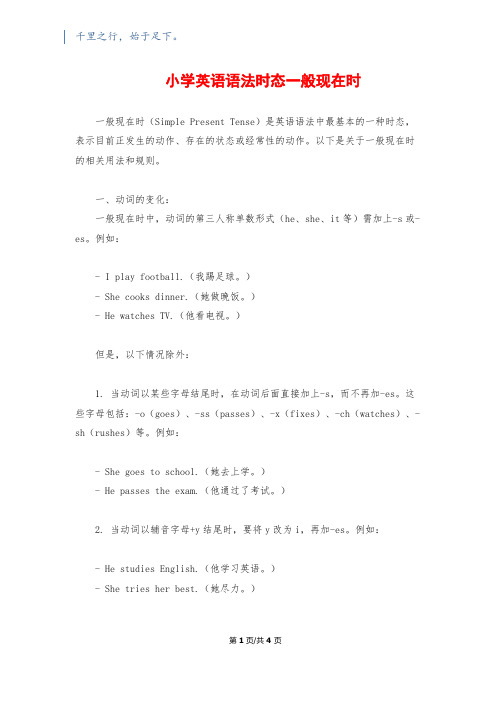小学英语一般现在时
小学英语语法一般现在时总结

千里之行,始于足下。
学校英语语法一般现在时总结学校英语语法一般现在时总结一般现在时是英语中最基础和最常用的时态之一,它用来表达经常性的、重复性的或普遍性的动作或状态。
在学校英语学习中,同学们需要把握一般现在时的用法和构造。
一般现在时的构造:一般现在时的确定句的构造为:主语 + 动词原形(第三人称单数要加-s 或-es)+其他。
例句:I play football every day.He plays football every day.She watches TV on weekends.一般现在时的否定句的构造为:主语 + do not / does not + 动词原形 +其他。
例句:I do not play football every day.He does not play football every day.She does not watch TV on weekends.一般现在时的疑问句的构造为:Do / Does + 主语 + 动词原形 +其他?例句:Do you play football every day?Does he play football every day?Does she watch TV on weekends?一般现在时的用法:1. 表示经常性的动作或习惯。
第1页/共3页锲而不舍,金石可镂。
例句:I brush my teeth before going to bed.She always eats an apple in the morning.They usually walk to school.2. 表示普遍性的事实或真理。
例句:Water boils at 100 degrees Celsius.The sun rises in the east.Dogs are loyal animals.3. 表示现阶段的状态。
例句:I am a student.She is a teacher.They are happy.4. 描述行程支配或固定时间的动作。
小学英语语法一般现在时详细讲解

主语(I/We/You/They)+ do+not+动词原形+其他
如:I don’t stay at home on Saturdays. They don’t have sports every day.
主语(He/She/It)+ does+not+动词原形+其他
特殊疑问句: 疑问词+一般疑问句? 直接回答,而不用yes 或no.
5.一般现在时的句型变换 1) I usually play football on Friday. 改为一般疑问句: Do you usually play football on Friday? 对划线部分提问: What do you usually do on Friday? 2) My father go to work by bike everyday. 对划线部分提问: How does your father go to work everyday?
3. 表示永恒不变的真理;
The moon goes round the earth.
一. be动词的一般现在时
be动词: 主语 + be +其它
如:I am a boy. 我是一个男孩。问句:
4) 特殊疑问句: 疑问词+ do/does+主语+动词原形+其他? 如: What do you want? What does she want? What time do you have lunch? What time does she have lunch? What do you do? What does she do? How do you spell it? How does he spell it?
小学英语语法时态讲解与归纳一般现在时

小学英语语法时态讲解与归纳—一般现在时一.意义: 表示经常发生的事情;动作或存在的状态二.构成及变化1.be动词的变化..肯定句:主语+beam;is;are+其它..如:.a..boy.我是一个男孩..否定句:主语.b..no.+其它..如:H.i.no..worker.他不是工人..一般疑问句:B.+主语+其它.. 如:-Ar.yo..studen.-Yes..am..No.I'.not.特殊疑问句:疑问词+一般疑问句..如:Wher.i.m.bik.2.行为动词的变化..l、当主语为第一;二人称及复数时;助动词为do肯定句:主语+动词原形+其它..如:W.ofte.pla.basketbal.afte.school.否定句:主语.don't+动词原形+其它..如:w.don’.pla.basketbal.afte.school.一般疑问句:D.+主语+动词原形+其.如.D.yo.ofte.pla.basketbal.afte.schoo....Yes.w.do..No.w.don't. 特殊疑问句:疑问词+以do开头的一般疑问句如.Wha.d.yo.ofte.d.afte.schoo.2、当主语为第三人称单数.;助动词为does肯定句:主语+动词三单式+其它..如.H.swim.well.否定句:主语.doesn’t+动词原形+其它..如:H.doesn’.swi.well..一般疑问句:Doe.+主语+动词原形+其它..如:Doe.h.swi.wel.Yes.h.does..No.h.doesn't.特殊疑问句:疑问词+以does开头的一般疑问句如.Ho.doe.you.fathe.g.t.wor.三.第三人称单数的动词变化规则只有在第三人称为主语的肯定句中;动词才用三单式1多数动词直接加s:runs gets likes collets takes playsclimbs…….2结尾是s.x.sh.ch.o;前为辅音字母;结尾加e.: watches teaches goes does washes crosses mixes brushes3动词末尾y前为辅音:将y改为i加es.study→studie.fly→flies carry→carriescry→cries但在y前如果为元音则直接加s: buys says四.时间标志:uall..ofte..sometime.;every…一般现在时练习题1I.用下列单词的适当形式填空1.We often___________play in the playground.2.He _________get up at six o’clock.3.__________you _________brush your teeth every morning4.What________________do he usually________________do after school5.Danny ________________study English; Chinese; maths; science and Art at school.6.Mike sometimes __________go to the park with his sister.7.At eight at night; she __________watch TV with his parents.8.________ Mike________read English every day9.How many lessons_________your classmates________have on Monday10.What time_________his mother_________do the houseworkII.改句子1.Do you often play football after school 改为肯定句2.I have many books.改为否定句3.Gao S han’s sister likes playing table tennis 改为否定句4.She lives in a small town near New York.改为一般疑问句5.I watch TV every day.改为一般疑问句6.We have four lessons.改为否定句7.Nancy doesn’t run fast 改为肯定句8.M.do.run.fast.................................否定句: 一般疑问句:9.Mike has two letters for him.一般疑问句:否定句: 10.I usually play football on Friday afternoon.否定句:一般疑问句:划线提问11.Su Yang usually washes some clothes on Saturday.否定句:一般疑问句:划线提问:12.Mingming usually waters the flowers every day.否定句:一般疑问句:13.Tom does his homework at home.否定句:一般疑问句:一般现在时练习题2一、用所给动词的真确形式填空1.. lik.___________.swim.2.H._________rea.Englis. ever. day.3.W._________got.schoo.a.seve.i.th.morning.4.Mike________got.schoo.a.seve.i.th.morning.5.M. mother________lik.______g.shopping.6..ca.________dra. man. beautifu. pictures.7.She_________mak.. mode. plane.8.D. yo.________like_________ru.9.Doe. he_________like_________jum.10.Doe.Nancy_________growflower.o.Saturda.11.Th. teachers________like___________dance.12.Th.teacher________like____________dance.13.Th.students___________spea.Englis.i.class.14.Th.student_________spea.Chines.afte.class.15.Let’s____________an.pla.footbal.. g.16.He____________.lik.swimmin.. no.17.I’.sorr.____________tha.. hea.18.Wan.Bin.is___________. writ. a.E-mai.t.hi.frien..19.H.has_____________.headach.. ge.20._________yo.stud.Englis.a.schoo..Ye..I___________. d.21.__________you.siste.stud.Englis.a.schoo..N..she_________.. d.22.I’.________.bette.. fee.23.Why__________To.absen.toda.. b.二、用所给的人称改写句子1..tak.photo.o.Sunday. Mike2.W.gro.beautifu.flowers.she3.The.lik.collectin.stamps.Ben4..liste.t.musi.carefully.m.aunt5.Yo.lik.makin..mode.ship.Helen6.W.clea.th.classroo.ever.day.he7.The.loo.afte.th.pandas.M.Wang8..dra..tre.an.som.flowers.Nancy9.W.g.t.be.a.eight. m.sister10..rea.newspaper.i.th.evening.M.Green。
小学英语一般现在时

3. My birthday is on July 1st. Is your birthday on July 1st? When is your birthday?
--The birds don't fly . --The bird doesn't fly.
03
一般疑问句及回答
一般疑问句及回答
Do
+主语 (非单三)
+动词(短 语)原形
+其他?
肯定回 答
Do
you/they /we
like
apples?
Ye s , I / t hey/w e do.
Does
一般现在时
一般现在时分为两种:
一是含有be动词的一般现在时
二是含有实义动词的一般现在时
常
见
的 1. be动词:be动词是对am,is,are的统称
两
种
2. 实义动词:有实际意义的动词。eg:walk(走) swim(游泳)
run(跑)
动 动词还有其他的分 词 类,比如系动词、
助动词等,今天我
们只学习这两种。
2.含有实义动词的一般现在时 经常出现often、usually、sometimes这类的词
01. 肯定句 02. 否定句 03. 一般疑问句 04. 特殊疑问句
01
肯
定
句
主语(非 单三)
I/They
主语(单 三)
She/He
肯定句句子结构
+动词(短语)原形
+其他。
小学英语语法-一般现在时详细讲解

小学英语语法-一般现在时详细讲解一般现在时是英语语法中最基础也是最常用的时态之一。
它表示的是习惯性、经常性和普遍性的行为或状态。
在本文中,我将详细介绍一般现在时的形式、用法和注意事项。
一、一般现在时的形式一般现在时的肯定句的基本结构是:主语+谓语动词+其他。
谓语动词在第三人称单数形式时要加上-s或-es。
例如:- I eat breakfast every morning.(我每天早上吃早饭。
)- She goes to school by bus.(她坐公共汽车去学校。
)否定句的结构是:主语+do not/does not+动词原形+其他。
例如:- I do not like coffee.(我不喜欢咖啡。
)- He does not play football.(他不踢足球。
)疑问句的结构是:Do/Does+主语+动词原形+其他?例如:- Do you like ice cream?(你喜欢冰淇淋吗?)- Does she go to the park every weekend?(她每个周末去公园吗?)二、一般现在时的用法第1页/共4页1. 表示习惯或经常性的动作:- I write in my diary every night.(我每天晚上写日记。
)- They play basketball every Sunday.(他们每个星期天打篮球。
)2. 表示客观事实、自然规律或科学真理:- Water boils at 100 degrees Celsius.(水在100摄氏度时煮沸。
)- The sun rises in the east.(太阳从东方升起。
)3. 表示感觉、想法和喜好:- I love chocolate.(我喜欢巧克力。
)- He hates to wake up early.(他讨厌早起。
)4. 表示现时状态或现时临时的动作:- I am a student.(我是一个学生。
小学英语语法知识点一般现在时

小学英语语法知识点一般现在时一般现在时是指在说话时发生的动作或状态,或者指经常、习惯性的动作或状态。
在小学英语学习中,学生首先需要掌握的就是一般现在时的用法。
下面是一些关于一般现在时的重要语法知识点:1. 第三人称单数动词的变化:在一般现在时中,第三人称单数的动词要加上-s或-es。
例如:he plays, she eats, it runs。
2. 否定句的构成:一般现在时的否定句要在动词前加上助动词do not或does not。
例如:I do not play, he does not eat。
3. 疑问句的构成:一般现在时的疑问句要将助动词do或does放在句首。
例如:Do you play? Does he eat?4. 给第三人称单数加上-s或-es的规则:大多数动词加上-s,但是以s、x、sh、ch结尾的动词加上-es。
例如:brushes, catches。
5.一般现在时的用法:- 表示经常或习惯性的动作:I brush my teeth every morning.- 表示现在的情况或状态:She lives in Beijing.- 表示客观真理或科学事实:The sun rises in the east.- 表示将来安排的事情:The train leaves at 8 o'clock tomorrow morning.6. 表示经常或习惯性的动作时,通常会和时间状语连用,如:every day, always, often, usually等。
例如:She always goes to school by bus.7. 表示现在的情况或状态时,通常与be动词连用,如:am, is, are。
例如:I am a student.8. 表示客观真理或科学事实时,通常不和时间状语连用。
例如:Water boils at 100 degrees Celsius.9.一般现在时中的一些特殊用法:- 示意要求或建议的动词(如:want, need, like, love, hate等)后接不定式,用法类似于祈使句。
小学英语语法时态讲解与归纳一般现在时

千里之行,始于足下。
小学英语语法时态讲解与归纳一般现在时一般现在时(Simple Present Tense)是表示经常性、习惯性或普遍性的动作或状态的时态。
它用于描述我们现在经常或总是发生的动作、习惯、经验、事实和固定的真理。
下面是小学英语语法时态讲解与归纳一般现在时的内容:1. 构成一般现在时的肯定句结构为:主语 + 动词原形(第三人称单数加-s)+ 其他。
例如:- I play soccer every Saturday.(我每个星期六踢足球。
)- She eats an apple every morning.(她每天早上吃一个苹果。
)2. 第三人称单数的变化在一般现在时中,第三人称单数的动词要加上-s、-es或-ies。
例如:- She plays soccer every Saturday.(她每个星期六踢足球。
)- He eats an apple every morning.(他每天早上吃一个苹果。
)- My brother watches TV every night.(我的哥哥每天晚上看电视。
)3. 否定句和疑问句第1页/共3页锲而不舍,金石可镂。
- 否定句:在动词前加do not(don't)或does not(doesn't)。
例如:- I don't play soccer every Saturday.(我不是每个星期六踢足球。
)- She doesn't eat an apple every morning.(她不是每天早上吃一个苹果。
)- 疑问句:将助动词do(does)提到主语前。
例如:- Do you play soccer every Saturday?(你每个星期六踢足球吗?)- Does she eat an apple every morning?(她每天早上吃一个苹果吗?)4. 频率副词频率副词用来修饰动词,表示动作发生的频率。
小学英语语法时态一般现在时

小学英语语法时态一般现在时一般现在时(Simple Present Tense)是英语语法中最基本的一种时态,表示目前正发生的动作、存在的状态或经常性的动作。
以下是关于一般现在时的相关用法和规则。
一、动词的变化:一般现在时中,动词的第三人称单数形式(he、she、it等)需加上-s或-es。
例如:- I play football.(我踢足球。
)- She cooks dinner.(她做晚饭。
)- He watches TV.(他看电视。
)但是,以下情况除外:1. 当动词以某些字母结尾时,在动词后面直接加上-s,而不再加-es。
这些字母包括:-o(goes)、-ss(passes)、-x(fixes)、-ch(watches)、-sh(rushes)等。
例如:- She goes to school.(她去上学。
)- He passes the exam.(他通过了考试。
)2. 当动词以辅音字母+y结尾时,要将y改为i,再加-es。
例如:- He studies English.(他学习英语。
)- She tries her best.(她尽力。
)第1页/共4页3. 当动词以-e结尾时,只需加上-s。
例如:- They write letters.(他们写信。
)- He can dance.(他会跳舞。
)二、用法:1. 描述客观事实或经常性动作:一般现在时常用于描述客观事实或经常性动作。
例如:- Water boils at 100 degrees Celsius.(水沸腾的温度是100摄氏度。
)- I usually go to bed at 10 o'clock.(我通常在10点钟上床睡觉。
)2. 描述现阶段的状态:一般现在时还可用来描述现阶段的状态或对现实情况的评论。
例如:- They live in New York.(他们住在纽约。
)- She looks tired.(她看起来很累。
- 1、下载文档前请自行甄别文档内容的完整性,平台不提供额外的编辑、内容补充、找答案等附加服务。
- 2、"仅部分预览"的文档,不可在线预览部分如存在完整性等问题,可反馈申请退款(可完整预览的文档不适用该条件!)。
- 3、如文档侵犯您的权益,请联系客服反馈,我们会尽快为您处理(人工客服工作时间:9:00-18:30)。
一般现在时(专项复习一)
一般现在时表示经常发生的、习惯性的动作或存 在的状态。
与频率副词usually ,often, sometimes ,always和 时间短语in the morning /afternoon/evening, on Sundays , every day/week/year连用
It is
a nurse.
a snake. girls. a student. students.
We are You are You are
They are beautiful girls.
一般现在时 (否定句)
在一般现在时中,句 中有be动词或情态动词 (can等)时,否定句在 be动词和情态动词后加 not。 例如
我的功能
1. 表示经常性、习惯性的动作或状态 • I wash the dishes every day. • You go to school by bus sometimes. • They usually have lunch at 11:30. • He always gets up early. 2. 表示表示客观事实 You are 13. He is a student. 3. 表示永恒不变的真理; The moon goes round the earth.
I am a student. You are a nurse.
He is a policeman.
He is a postman.
It is a snake. It is a lion. They are animals.
I He
am Chen Jie. is a policeman.
She is
变一般疑问句
They are students.
Are
they
students ?
Yes, they are. No,they aren’t.
Is He
he is
Cheng Long .?
Chen Jie .?
Are I
you am
Are you We are
You Are are you
They don’t often play basketball on Sunday.
Mike doesn’t plays
football every day.
The students don’t do homework every day.
一般现在时 (一般疑问句)
句中没有be动词或情态动词时, 主语为非第三人称单数,变一般疑问 句在句首加Do,句子中动词用原形。 主语为第三人称单数,一般疑问句在 句首加Does,句子中原有动词用原形; Some变any. 例如
sit________ sits go goes makes make ________ writes write________ cry________ cries watch_______ watches says say_______ has have______
swim________ swims do _______ does run ________ runs sees see_ _____ study _________ studies wash_______ washes plays play _______ takes take_______
1)当谓语是实意动词时,一般现在时的构成: ①主语(非第三人称单数)+动词原形+其他 如:I often watch TV in the evening. Amy and Sarah like playing football. ②主语(第三人称单数)+动词的第三人称单数形 式+其他 如:John usually goes shopping on Sundays. Mike studies English every day.
Chinese .?
a student . ?
She is Is she
Is It it is Are are they They
lucy . ?
Zoom .? beautiful girls .?
二. 实义动词的一般现在时 1、什么叫实义动词? 实义动词是指表示有具体意思的动词, 也叫行为动词。 如: like(喜欢), eat(吃), live(居住), have(有), run(跑) 等等。 实义动词占英语中动词的绝大多数。
always(总是) often(经常)
hardly(几乎不) never(从不) every year(每年) on Monday(在星期一)
usually(通常) sometimes(有时)
rarely(很少) every day(每天) all the time(所有时间) in January (在某月)
二、单个人名、地名或称呼作主 语;是第三人称单数。
①Chen Jie looks like her mother. 陈洁看起来像她的母亲 ②Beijing is in China. 北京在中国。 ③My mother often makes cakes. 王叔叔经常做蛋糕。
实义动词第三人称单数的动词形式变化规则: 1、一般情况下,直接加s,如: reads, plays, works, makes 2、以s, x, ch, sh,o结尾的单词,后加es. 如: watches washes teaches does goes 3、以辅音字母+y结尾的单词, 变y为i,再加es, 如:flies, studies 4、不规则变化 如:have-has
变否定句
I am a good boy. I am not a good boy.
变否定句
He is a student. He is not (isn’t) a students.
变否定句
They are students. They are not (aren’t) students.
变否定句
一般现在时 (否定句)
1、I am a teacher.否:I am not a teacher.
2、He is a student.否: He is not a student.
3、You are a boy.否: You are not a boy. 4、I can swim.否: I can not(can’t) swim.
Do you go to school every day?
变一般疑问句
Mike likes playing computer games. Does Nancy likes games? playing computer
变一般疑问句
John wants some bread. Does John want any bread?
否: I don’t 2、He goes
to school by bus. to school by bus.
否:He doesn’t go
变否定句
I study English every day. I don’t study English every day.
变否定句
She speaks Chinese well.
She doesn’t speaks Chinese well.
They don’t take a shower everyday.
He doesn’t often go es to school on foot. You don’t usually go home by bus.
We don’t take a shower every day.
Can you swim?
Are they teachers?
变一般疑问句
I am a student.
Are
you
a student ?
Yes, I am. No,I am not.
变一般疑问句
John is my Is John
friend.
your friend?
Yes, he is. No,he isn’t.
She can speak English. She can not (can’t) speak English.
I
am not
Jack.
We are not
You are not He is
not
boys.
a teacher. Jerry.
She is not
It is
not
Lisa.
Tom.
They are not
一般现在时
(否定句)
句中没有be动词或情态动 词时,主语为第三人称单数的 变否定句在动词前加does not (doesn’t),非单三时,变否定 句在动词前加do not(don’t) 例如
一般现在时 (否定句)
1、I go to school by bus. go to school by bus.
beautiful girls.
一般现在时 (疑问句)
句中有be动词或情态动词时,be 动词或情态动词can提前,首字母变 为大写;some 变any;第一人称变成 第二人称。
例如
一般现在时 (一般疑问句)
He is a student. You are a boy.
Is he a student? Are you a boy? I can swim. They are teachers.
Yes, he does. No,he doesn’t.
Does Amy often playes basketball on Sunday ? .
